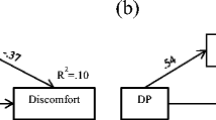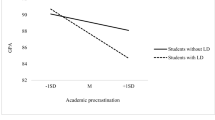Abstract
This article examines one institution’s transition from a legalistic approach for resolving cases of academic misconduct to a learning-centered approach that embraces peer-to-peer student-led meetings. The article provides detailed information on how to train students on conducting these meetings along with suggestions for future research. The results of this article provide a framework for institutions who wish to engage students in a learning-centered adjudication model for resolving cases.
Similar content being viewed by others
References
ACPA. (2010). Student Conduct Board Manual and Reference (Second Ed.). American College Personnel Association.
Baetz, M., Zivcakova, L., Wood, E., Nosko, A., De Pasquale, D., & Archer, K. (2011). Encouraging active classroom discussion of academic integrity and misconduct in higher education business contexts. Journal of Academic Ethics, 9(3), 217–234. https://doi.org/10.1007/s10805-011-9141-4
Boots, C. C. (1987). Human development theory applied to judicial affairs work. In. R. Caruso & W. W. Travelstead (Eds.). Enhancing campus judicial systems. New Directions for Student Services, 39, San Francisco: Jossey-Bass.
Clark, K. L. (2014). A call for restorative justice in higher education judicial affairs. College Student Journal, 48(4), 705–713.
Drinan, P., & Gallant, T. (2008). Plagiarism and academic integrity systems. Journal of Library Administration, 47(3–4), 125–140. https://doi.org/10.1080/01930820802186472
Grimsrud, T., & Zehr, H. (2002). Rethinking God, Justice, and Treatment of Offenders. Journal of Offender Rehabilitation, 35(3–4), 253–279.
Henningsen, M., Valde, K., & Denbow, J. (2013). Academic Misconduct: A goals-plans-action approach to peer confrontation and whistle-blowing. Communication Education, 62(2), 148–168. https://doi.org/10.1080/03634523.2012.752509
Itin, C. M. (1999). Reasserting the Philosophy of Experiential Education as a Vehicle for Change in the 21st Century. Journal of Experiential Education, 22(2), 91–98.
Janosik, S. M., & Stimpson, M. T. (2017). The influence of the conduct system and campus environments on student learning. Journal of Student Affairs Research and Practice, 54(1), 28–41. https://doi.org/10.1080/19496591.2016.1204926
Karp, D., & Conrad, S. (2005). Restorative justice and college Student Misconduct. Public Organization Review, 5(4), 315–333. https://doi.org/10.1007/s11115-005-5094-7
Karp, D., & Sacks, C. (2014). Student conduct, restorative justice, and student development: findings from the STARR project: a student accountability and restorative research project. Contemporary Justice Review, 17(2), 154–172. https://doi.org/10.1080/10282580.2014.915140
Kibler, W. L. (1993). A framework for addressing academic dishonesty from a student development perspective. NASPA Journal, 31, 8–17.
Malizia, D., & Jameson, J. (2018). Hidden in plain view: The impact of mediation on the mediator and implications for conflict resolution education. Conflict Resolution Quarterly, 35(1), 301–318. https://doi.org/10.1002/crq.21212
McCabe, D. L., & Makowski, A. L. (2001). Resolving allegations of academic dishonesty. About Campus: Enriching the Student Learning Experience, 6(1), 17–21. https://doi.org/10.1177/108648220100600104
Miller, A., Murdock, T., Anderman, E., & Poindexter, A. (2007). Who are all these cheaters? Characteristics of academically dishonest students. In E. Anderman & T. Murdock (Eds.), Psychology of academic cheating (pp. 9–32). Elsevier.
Malis, R. S., & Roloff, M. E. (2007). The Effect of Legitimacy and Intimacy on Peer Interventions into Alcohol Abuse. Western Journal of Communication, 71(1), 49–68.
Pointer, L. (2018). Restorative practices in residence halls at Victoria University of Wellington. New Zealand. Conflict Resolution Quarterly, 36(3), 263–271. https://doi.org/10.1002/crq.21240
Robertson, D. A. (1988). An Opportunity to Be Heard: The Right to Counsel in a Deportation Hearing. Wash. L. Rev., 63, 1019.
Ryan, A. M. (2000). Peer groups as a context for the socialization of ADOLESCENTS' Motivation, engagement, and achievement in school. Educational Psychologist, 35(2), 101–111. https://doi.org/10.1207/s15326985ep3502_4.
Schrader, P. G., & Brown, S. W. (2008). Evaluating the first Year Experience: Students’ KNOWLEDGE, attitudes, and behaviors. Journal of Advanced Academics, 19(2), 310–343. https://doi.org/10.4219/jaa-2008-775
Schraw, G., Olafson, L., & Wadkins, T. (2007). Doing the things we do: A grounded theory of academic procrastination. Journal of Educational Psychology, 99(1), 12–25. https://doi.org/10.1037/0022-0663.99.1.12
Schwartz, B. M., Tatum, H. E., & Hageman, M. C. (2013). College students’ perceptions of and responses to cheating AT Traditional, modified, and Non-Honor System institutions. Ethics & Behavior, 23(6), 463–476. https://doi.org/10.1080/10508422.2013.814538
Stehno, J. (1986). The application and integration of experiential education in higher education. Carbondale, IL: Southern Illinois University, Touch of Nature Environmental Center.
Stephens, J. M., & Gehlbach, H. (2007). Under pressure and underengaged. Psychology of Academic Cheating, 107-134. https://doi.org/10.1016/b978-012372541-7/50009-7
Vandehey, M., Diekhoff, G., & LaBeff, E. (2007). College cheating: A twenty-year follow-up and the addition of an honor code. Journal of College Student Development, 48(4), 468–480. https://doi.org/10.1353/csd.2007.0043
Whetten, D., & Cameron, K. (2014). Developing Management Skills: Global Edition. Pearson Higher Ed.
Williams, K. M., Nathanson, C., & Paulhus, D. L. (2010). Identifying and profiling scholastic cheaters: Their personality, cognitive ability, and motivation. Journal of Experimental Psychology: Applied, 16(3), 293–307. https://doi.org/10.1037/a0020773
Yachison, S., Okoshken, J., & Talwar, V. (2018). Students’ Reactions to a Peer’s Cheating Behavior. Journal of Educational Psychology, 110(6), 747–763.
Zehr, H. (1997). Restorative justice: The concept: Movement sweeping criminal justice field focuses on harm and responsibility. Corrections Today, 59, 68–70.
Zehr, H. (1998). Fundamental concepts of restorative justice. Contemporary Justice Review.
Zehr, H. (2004). Commentary: Restorative justice: Beyond victim-offender mediation. Conflict Resolution Quarterly, 22(1), 305–315.
Zivcakova, L., Wood, E., Forsyth, G., Zivcak, M., Shapiro, J., Coulas, A., & Angardi, V. (2014). Investigating perceptions of students to a peer-based academic integrity presentation provided by residence dons. Journal of Academic Ethics, 12(2), 89–99. https://doi.org/10.1007/s10805-014-9206-2
Author information
Authors and Affiliations
Corresponding author
Ethics declarations
Ethical Standards
We have complied with the ethical standards outlined by the journal.
Conflict of Interest
The authors declare that they have no conflict of interest.
Additional information
Publisher's Note
Springer Nature remains neutral with regard to jurisdictional claims in published maps and institutional affiliations.
Rights and permissions
About this article
Cite this article
Orr, J.E., Orr, K. Restoring Honor and Integrity Through Integrating Restorative Practices in Academic Integrity with Student Leaders. J Acad Ethics 21, 55–70 (2023). https://doi.org/10.1007/s10805-021-09437-x
Accepted:
Published:
Issue Date:
DOI: https://doi.org/10.1007/s10805-021-09437-x




